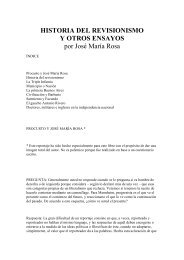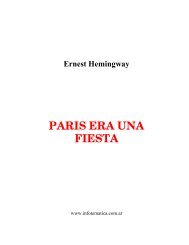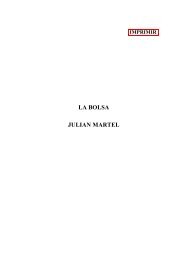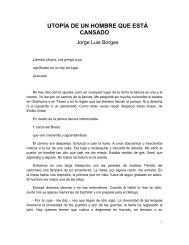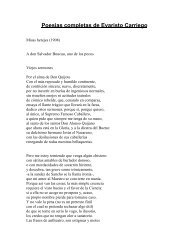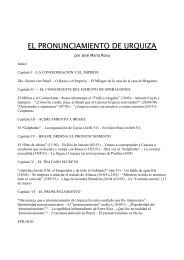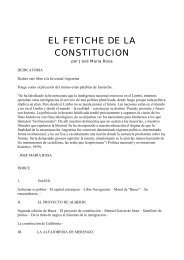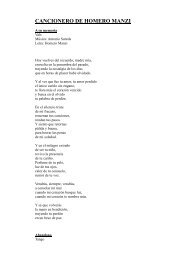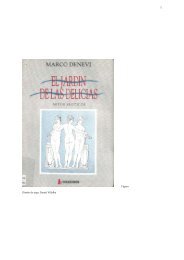You also want an ePaper? Increase the reach of your titles
YUMPU automatically turns print PDFs into web optimized ePapers that Google loves.
"The Unbearable Lightness Of Being" By Milan Kundera 70<br />
monument of note destroyed in the war, and they decided to leave it in ruins so that no<br />
Pole or German could accuse them of having suffered less than their share. In front of<br />
the glorious ruins, a reminder for now and eternity of the evils perpetrated by war, stood<br />
a steel-bar reviewing stand for some demonstration or other that the Communist Party<br />
had herded the people of Prague to the day before or would be herding them to the day<br />
after.<br />
Gazing at the remains of Old Town Hall, Tereza was suddenly reminded of her mother:<br />
that perverse need one has to expose one's ruins, one's ugliness, to parade one's<br />
misery, to uncover the stump of one's amputated arm and force the whole world to look<br />
at it. Everything had begun reminding her of her mother lately. Her mother's world,<br />
which she had fled ten years before, seemed to be coming back to her, surrounding her<br />
on all sides. That was why she told Tomas that morning about how her mother had<br />
read her secret diary at the dinner table to an accompaniment of guffaws. When a<br />
private talk over a bottle of wine is broadcast on the radio, what can it mean but that the<br />
world is turning into a concentration camp?<br />
Almost from childhood, Tereza had used the term to express how she felt about life with<br />
her family. A concentration camp is a world in which people live crammed together constantly,<br />
night and day. Brutality and violence are merely secondary (and not in the least<br />
indispensable) characteristics. A concentration camp is the complete obliteration of<br />
privacy. Prochazka, who was not allowed to chat with a friend over a bottle of wine in<br />
the shelter of privacy, lived (unknown to him—a fatal error on his part!) in a<br />
concentration camp. Tereza lived in the concentration camp when she lived with her<br />
mother. Almost from childhood, she knew that a concentration camp was nothing<br />
exceptional or startling but something very basic, a given into which we are born and<br />
from which we can escape only with the greatest of efforts.<br />
The women sitting on the three terraced benches were packed in so tightly that they<br />
could not help touching. Sweating away next to Tereza was a woman of about thirty<br />
with a very pretty face. She had two unbelievably large, pendulous breasts hanging<br />
from her shoulders, bouncing at the slightest movement. When the woman got up,<br />
Tereza saw that her behind was also like two enormous sacks and that it had nothing in<br />
common with her fine face.<br />
Perhaps the woman stood frequently in front of the mirror observing her body, trying to<br />
peer through it into her soul, as Tereza had done since childhood. Surely she, too, had<br />
harbored the blissful hope of using her body as a poster for her soul. But what a<br />
monstrous soul it would have to be if it reflected that body, that rack for four pouches.<br />
Tereza got up and rinsed herself off under the shower. Then she went out into the<br />
open. It was still drizzling. Standing just above the Vltava on a slatted deck, and<br />
sheltered from the eyes of the city by a few square feet of tall wooden panel, she<br />
looked down to see the head of the woman she had just been thinking about. It was<br />
bobbing on the surface of the rushing river.<br />
The woman smiled up at her. She had a delicate nose, large brown eyes, and a childish<br />
glance.



